by HEC Team | Jan 29, 2015 | 2015, News
Plans are well underway for the 2015 Maui Energy Conference and the program committee is shaping a very compelling program! Stay tuned for further program announcements in the next few days. Our planning team has also been working with our corporate partners to confirm sponsorship and exhibit plans for the Conference. Exhibit space is filling quickly, too, so we’d love to hear from your organization soon!
Why Attend the Maui Energy Conference?
- Gain a competitive advantage—learn from thought leaders about key issues in the industry
- Connect and collaborate—forge partnerships to address common issues and concerns
- Showcase your organization—generate new business through Sponsorship and Exhibiting
Register Today!
We’ve assembled an impressive program, noted speakers, and plenty of networking opportunities, don’t wait, Register Now!
Contact Us
Visit us online or contact Sandy Ryan, Conference Director, at 808-875-2318 or by email.
by HEC Team | Dec 29, 2014 | 2015, News
Aloha and Season’s Greetings,
We are pleased to announce the MAUI ENERGY CONFERENCE, March 25-27, 2015 at the Maui Arts & Cultural Center!
You’re invited to join us as we explore the evolving role of the electric utility through the lens of the customer. The relationship between customers and electric utilities is changing with the growing array of options and services available to meet customer energy needs. Nationally recognized experts will discuss emerging trends in the electric utility industry and public policy shaping customer choices including customer engagement programs, distributed generation, microgrids, demand response programs, and renewables integration.
Details on this year’s program are available at our new Conference website, www.mauienergyconference.com.
And don’t miss the opportunity to boost your company’s presence at the conference with an early sponsor and exhibit commitment. The Sponsor & Exhibit Kit is available for download now!
Our Conference Program Committee and Team look forward to welcoming you in March and to answering any questions you may have in the meantime.
See you in the New Year,
The Maui Energy Conference Team
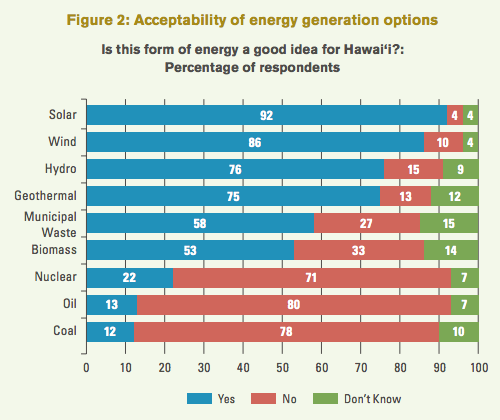
by HEC Team | Oct 31, 2014 | News
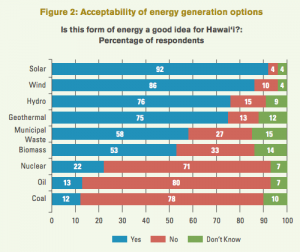 The College of Tropical Agriculture and Human Resources (CTAHR) at University of Hawai‘i at Manoa recently published a report. A representative survey of 1,214 Hawai‘i residents was conducted for the purpose of assessing public attitudes about different technologies for generating electricity. Renewable energy (RE) technologies were very highly favored: 97% of the public supported increased development of at least some forms of RE in our state.
The College of Tropical Agriculture and Human Resources (CTAHR) at University of Hawai‘i at Manoa recently published a report. A representative survey of 1,214 Hawai‘i residents was conducted for the purpose of assessing public attitudes about different technologies for generating electricity. Renewable energy (RE) technologies were very highly favored: 97% of the public supported increased development of at least some forms of RE in our state.
The full report can be found and downloaded here.
by HEC Team | Apr 29, 2014 | News
Originally published on Utility Drive
Hawaii is as beautiful as ever, with our palm trees, ocean breezes and plenty of sunshine. But it is no longer just our tourists on the beaches who are soaking up the rays. There are photovoltaic systems everywhere and at least one concentrating solar power system—more solar power than hula skirts and surfboards!
Hawaiian utilities have installed more than 42,000 PV systems through the end of 2013: 9% of the nation’s total, despite having less than 1% of the country’s utility customers. Similarly, almost 9% of utility customers now have solar, versus 0.5% nationwide. No other state in the country has experienced anything close to our level of solar penetration.
Read the full article on Utility Drive
by HEC Team | Apr 11, 2014 | 2014, News
The eyes of the nation are on Hawai‘i as a living laboratory.
At the end of March, Maui hosted a conference–“Electric Utilities: The Future Is Not What It Used To Be.”
As Mayor Alan Arakawa said in his welcome address, electricity has become an important issue for Maui, as utility bills average $250, even though the island has an abundance of natural resources.
Together with the wind farms, solar has replaced a quarter of diesel-generated electricity, placing Maui Electric Company (MECO) at the forefront of an epochal, nationwide change.
The two-day conference at the Maui Arts & Cultural Center was the brainchild of Kihei’s Maui Economic Development Board (MEDB) and the Mayor’s Office.
Published in Maui Weekly (no longer available online)
by HEC Team | Apr 10, 2014 | 2014, News
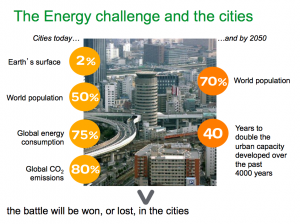
Bob Lachenmayer’s presentation, Redefining the Customer’s Role in the Utility of the Future
Presentations from the recent energy conference, “Electric Utilities: The Future Is Not What It Used To Be” held March 26 and 27, 2014, at the Maui Arts & Cultural Center are now available online for viewing and downloading.
The conference, presented by the Mayor’s Office of Economic Development and the Maui Economic Development Board, featured more than 250 recognized policy-makers from state and federal government and the private sector. They talked openly and frankly about the country’s rapidly changing energy landscape and its implications for power utilities, policy-makers and consumers.
Presentation topics included:
- The Shifting Landscape of the Utility Business Model: What are the Key Drivers of Change?
- Expectations of Tomorrow’s Utility Customers
- The Evolving Energy Mix in a 21st Century Utility
- The Regulation of Electric Utilities in Japan Post Fukushima: An Overview
- Redefining the Customer’s Role in the Utility of the Future
- What Role Will Technology Play in Transforming to a 21st Century Utility?
- How Will the Electric System Change in the Future?
- Hawaii’s Unique Place in the Emerging Energy Transformation
Presentations are available on the Proceedings page.
by HEC Team | Apr 5, 2014 | 2014, News
Energy leaders agree Hawaii can lead changes in energy landscape. Maui conference participants impressed by open and frank discussions.
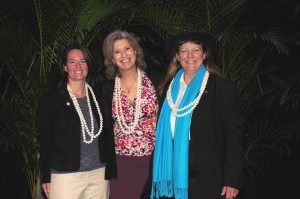
Conference presenters (l-r): Julia Hamm, President & CEO, Solar Electric Power Association; Alice Madden, Principal Deputy Assistant Secretary for Intergovernmental and External Affairs, U.S. Department of Energy; and L Hunter Lovins, President, Natural Capitalism Solutions
The buzz that came from the Maui energy conference was that the three-day conference of leading energy experts, industry leaders and activists was Hawaii’s “postcard to the future.”
“This doesn’t end here. It’s a beginning, not an end,” said Mayor Alan Arakawa, who delivered opening remarks. “We’re excited to see where all the conversations that began at this conference go, and how participants will take away what they’ve learned or shared and lead us into a bright, sustainable energy future.”
“The conference exceeded my expectations,” said Maui Economic Development Board President and Chief Executive Officer Jeanne Skog. “It’s now very clear that we all need to work together to find ways to overcome the challenges and make the most of opportunities available as our nation makes a transition from power generation from fossil fuels to renewable energy.”
“We thank all of our outstanding speakers, our co-sponsors, exhibitors and everyone behind the scenes that helped make this a very successful event,” Skog said.
“Electric Utilities: The Future Is Not What It Used To Be” was held March 26 and 27, 2014, at the Maui Arts & Cultural Center. Many of the conference participants spent the event’s third day on Friday touring the Kaheawa Wind Farm, hosted by First Wind; orienting themselves on the topic of “Energy Through Agriculture” at the Hawaiian Commercial & Sugar Company field and factory; and learning about the Smart Grid Demonstration Project called JumpSMARTMaui, led by Hitachi Ltd. and NEDO.
The conference, presented by the Mayor’s Office of Economic Development and the Maui Economic Development Board, featured more than 250 recognized policy-makers from state and federal government and the private sector. They talked openly and frankly about the country’s rapidly changing energy landscape and its implications for power utilities, policy-makers and consumers. At least half of the conference participants reside on Maui, and the other half traveled from the U.S. Mainland, Canada and Japan.
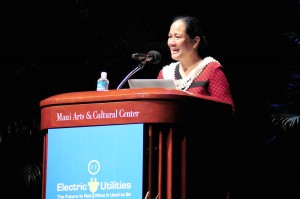
Hawaii Public Utilities Commission Chair Hermina Morita delivered closing remarks.
Program Committee member Jonathan Koehn said he was “incredibly impressed” by the recognition of the transformation taking place in utilities and a focus on opportunity and vision for the future. “It doesn’t matter where we’re starting from, it’s the evolution of the energy business model that is essential and we all can explore the opportunities together,” he said.
“These are the visionaries,” he said about the participating policy-makers, government leaders, legislators and top executives of the utilities and renewable energy companies. “To me it’s a great partnership and spectrum that came here,” said Koehn, the Regional Sustainability Coordinator for the City of Boulder, Colo.
Molokai businesswoman Barbara Haliniak, who serves as president of the Molokai Professional Women’s League, said she was initially skeptical about the conference and concerned that speakers and conversations would be of technical nature.
“I’m so glad it wasn’t so technical that I couldn’t understand,” she said. Her takeaway from the conference: “In order for the utilities and renewable energies to move forward, the entire community needs to engage in dialogue. That’s the only way you are going to get where you want to go. … You can’t be one-sided.”
Arlan Chun, senior vice president of development and construction for Pulama Lanai, said the conference was helpful for him and his organization’s goals in seeking sustainability for the people of Lanai. “I think it opens our eyes to some of the issues we’re going to be facing,” Chun said.
Steffes Corporation, a manufacturer in the oil industry, was one of about 20 exhibitors at the conference. Al Takle of Steffes Heating System said he found networking with the top leaders in energy policy and outlook to be most helpful at the conference. As far as the prospects of the future in energy, Takle said: “The rest of the world is watching the Hawaiian energy market as they navigate this transformational change.”
by HEC Team | Apr 3, 2014 | 2014, News
Last week’s successful Electric Utilities of the Future Conference sparked a dialogue centered around the emergence of new utility models in Hawaii. Think Tech Hawaii’s Jay Fidel recently led a robust discussion recapping the Conference. Joining Jay in the conversation were Warren Bollmeier, President of the Hawaii Renewable Energy Alliance; Henry Curtis of Ililani Media; Ray Starling, Director of the Hawaii Energy Program at Leidos; and Doug McLeod, Maui County Energy Commissioner.
by HEC Team | Mar 31, 2014 | 2014, News
Originally published on Ililani Media
A Hawaii Energy Conference like no other Hawaii Energy Conference took place over the past two days on Maui.
The power brokers of the incumbent electric utility were there in force.
Hawaiian Electric Industries (HEI) owns Hawaiian Electric Company (HECO) which owns Maui Electric Company (MECO).
The head of all three were in attendance: HEI CEO Connie Lau, HECO President Richard Rosenblum and MECO President Sharon Suzuki.
The leadership of the Public Utilities Commission attended. This included all three PUC Commissioners, the Chief Policy Researcher and the Chief Counsel.
Key representatives from the Counties of Kauai, Maui and Hawai’i attended. These three Hawaii Counties are actively engaged in Energy Policy (Honolulu has seldom taken the issue seriously).
And more than attend, these three groups — the utilities, the regulators and the counties –addressed the audience and engaged in dialogue.
About 245 people attended the conference sponsored by the Maui County and the Maui Economic Development Board.
Attendees consisted of 75 women and 170 men. The breakout by region was 73 people from Maui, 104 from other areas of the State, 54 from the rest of the country, 3 from Canada and 11 from Japan; 53 from the public sector, 168 from the private sector and 24 from the non-profit sector. Most of those from the non-profit sector were representatives from energy trade groups and consultants.
The Event was held at the Maui Arts & Cultural Center. The facility is open, airy and has expansive views of the mountains. The site is next to Maui Community College and adjacent to a large solar generation facility.
Read the full article on Ililani Media
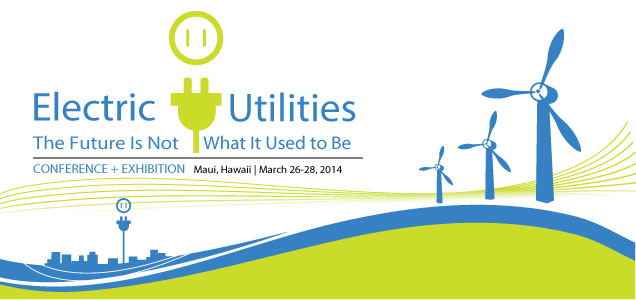
by HEC Team | Mar 29, 2014 | 2014, Past Conferences
Electric Utilities: The Future Is Not What It Used to Be
PROGRAM
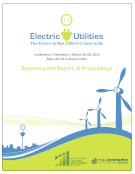
Download the Program Booklet
PRESENTATIONS
Day 1 | Wednesday, March 26, 2014
KEYNOTE REMARKS
Alice Madden, Principal Deputy Assistant Secretary for Intergovernmental and External Affairs, U.S. Department of Energy
Julia Hamm, President & CEO, Solar Electric Power Association (SEPA)
L. Hunter Lovins, President, Natural Capitalism Solutions
THE SHIFTING LANDSCAPE OF THE UTILITY BUSINESS MODEL: WHAT ARE THE KEY DRIVERS OF CHANGE?
Jonathan Koehn, Regional Sustainability Coordinator, City of Boulder, Moderator
Hermina Morita, Chair, Hawaii Public Utilities Commission
William “Bill” Parks, Senior Technical Advisor, Office of Electricity Delivery and Energy Reliability, U.S. Department of Energy
Lauren Azar, Former Commissioner, Wisconsin Public Service
EXPECTATIONS OF TOMORROW’S UTILITY CUSTOMERS
Maurice Kaya, Program Director, PICHTR, former head of the State Energy Office, Moderator
Dawn Weisz, Executive Officer, Marin Clean Energy
Michael Mount, Vice President, Pace Global, a Siemens Business
Tom Plant, Vice President, State Policy at Advanced Energy Economy
Will Rolston, Energy Coordinator, County of Hawaii
THE EVOLVING ENERGY MIX IN A 21ST CENTURY UTILITY
Jay Griffin, Policy and Research Director, Hawaii Public Utilities Commission, Moderator
Jennifer DeCesaro, Special Advisor, Office of the Secretary of Energy, U.S. Department of Energy
Ken Geisler, Vice President of Strategy, Siemens Smart Grid, North America
Jonathan Koehn, Regional Sustainability Coordinator, City of Boulder
David Bissell, President and CEO, Kauai Island Utility Cooperative
THE REGULATION OF ELECTRIC UTILITIES IN JAPAN POST FUKUSHIMA: AN OVERVIEW
Kazuhiko Ogimoto, Project Professor, Institute of Industrial Science, University of Tokyo
WHAT ROLE WILL TECHNOLOGY PLAY IN TRANSFORMING TO A 21ST CENTURY UTILITY?
Doug McLeod, Energy Commissioner, Maui County, Moderator
Kazuhiko Ogimoto, Project Professor, Institute of Industrial Science, University of Tokyo
Kazuyuki Takada, Deputy Director, Smart Community Department, NEDO
Fumitoshi Emura, Department Manager, Smart City Project Division, Hitachi, Ltd.
Mark Glick, Administrator, Hawaii State Energy Office, DBEDT
Michael Reiley, President, HNU Energy
Day 2 | Thursday, March 27, 2014
MAUI TOPICS DISCUSSION (Optional)
Sebastian “Bash” Nola, Energy Consultant, Moderator
Carl Freedman, Owner, Haiku Design and Analysis
Mathew McNeff, Engineering Department Manager, Maui Electric Company
Matias Besasso, Owner, Rising Sun Solar + Electric
Bob King, Founder, Pacific Biodiesel
Don Guzman, Council Member, Maui County
KEYNOTE REMARKS
Ron Binz, Former Chief, Colorado Public Utilities Commission
REDEFINING THE CUSTOMER’S ROLE IN THE UTILITY OF THE FUTURE
Lorraine Akiba, Commissioner, Hawaii Public Utilities Commission, Moderator
Neil “Dutch” Kuyper, Chief Executive Officer, Parker Ranch
H. Ray Starling, Program Director, Hawaii Energy
Bob Lachenmayer, Smart Cities Manager, Schneider Electric
Ben Springer, Senior Associate, Energy Futures Coalition
HOW WILL THE ELECTRIC SYSTEM CHANGE IN THE FUTURE?
Bob Lachenmayer, Smart Cities Manager, Schneider Electric, Moderator
Ron Binz, Former Chair, Colorado Public Utilities Commission
L. Hunter Lovins, President, Natural Capitalism Solutions
Richard Rosenblum, Chief Executive Officer, Hawaiian Electric
Ben York, Sr. Project Engineer, Electric Power Research Institute
Kyle Datta, General Partner, Ulupono Initiative
HAWAII’S UNIQUE PLACE IN THE EMERGING ENERGY TRANSFORMATION
Constance Lau, President and Chief Executive Officer, Hawaiian Electric Industries Inc.
CLOSING REMARKS
Hermina Morita, Chair, Hawaii Public Utilities Commission


 The College of Tropical Agriculture and Human Resources (CTAHR) at University of Hawai‘i at Manoa recently published a report. A representative survey of 1,214 Hawai‘i residents was conducted for the purpose of assessing public attitudes about different technologies for generating electricity. Renewable energy (RE) technologies were very highly favored: 97% of the public supported increased development of at least some forms of RE in our state.
The College of Tropical Agriculture and Human Resources (CTAHR) at University of Hawai‘i at Manoa recently published a report. A representative survey of 1,214 Hawai‘i residents was conducted for the purpose of assessing public attitudes about different technologies for generating electricity. Renewable energy (RE) technologies were very highly favored: 97% of the public supported increased development of at least some forms of RE in our state.



